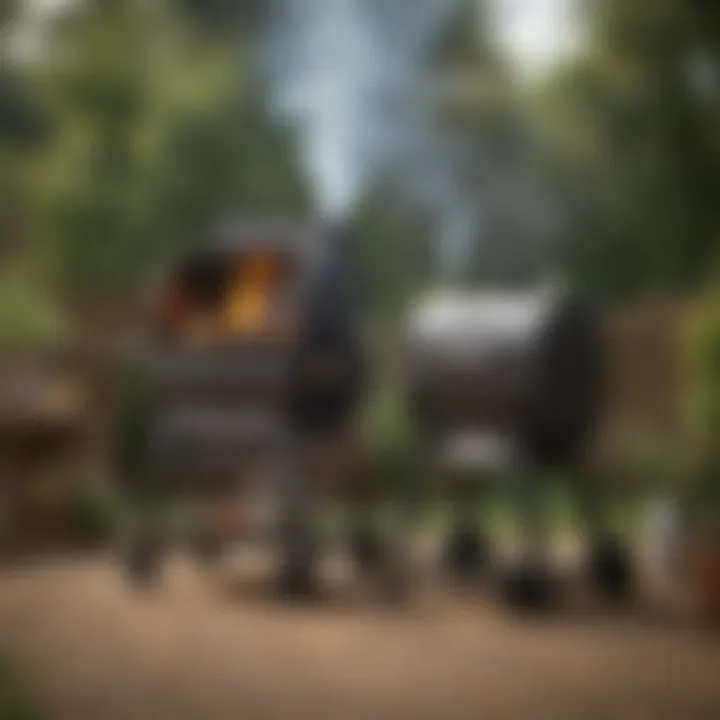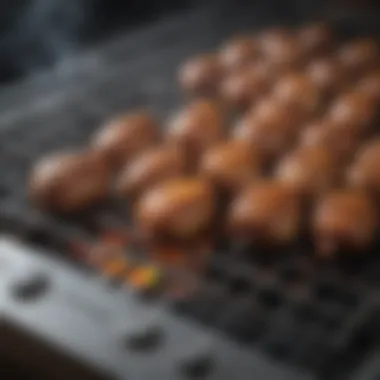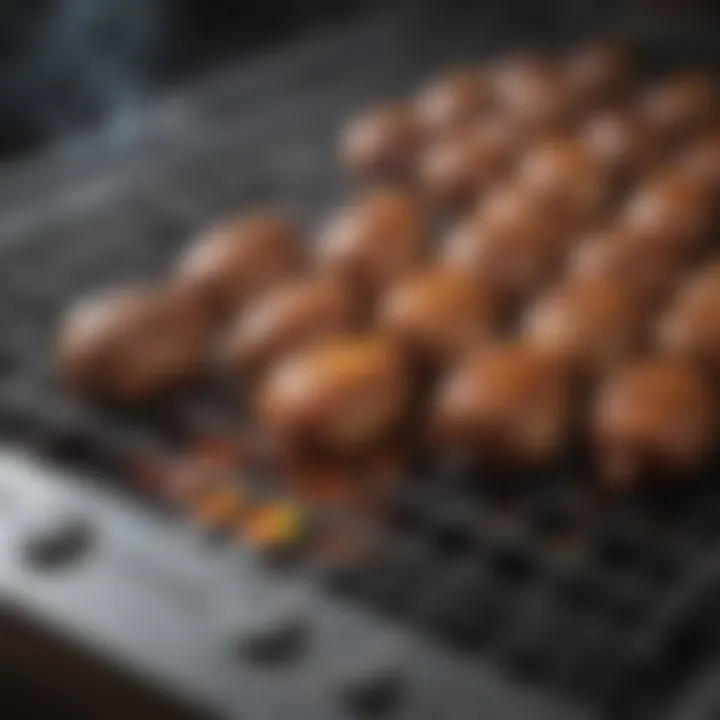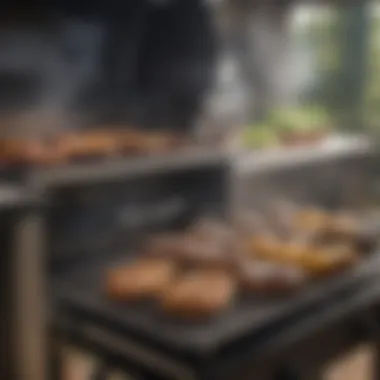Pellet Smoker vs Gas Grill: Key Differences Explained


Intro
The choice between a pellet smoker and a gas grill plays a crucial role for cooking enthusiasts, particularly in the realm of outdoor cooking. Understanding the distinctive functionalities and characteristics of these two popular appliances can dramatically influence the culinary experience. As barbecues become a communal celebratory activity for friends and family, analyzing their pros, cons, and unique features means a diligent approach. This analysis intends to provide clarity, enabling cooks to optimize their grilling versatility depending on personal preferences and catering needs.
Amid busy lives, discerning individuals need cooking solutions that not only yield superior flavors but also maintain efficient operation. This article dissects the key parameters of pellet smokers and gas grills, smoothing the decision-making process and enhancing your cooking repertoire.
Flavor Profiles
One of the most significant aspects that chefs emphasize is flavor. Pellet smokers are well-regarded for their ability to infuse rich, smoky flavors into dishes. This mechanism uses wood pellets, generating both the heat and smoke needed, offering you the chance to select various types of wood for different taste profiles. Meanwhile, gas grills provide consistent heat with high convenience, allowing a user to achieve a classic grilled flavor without charring.
Careful consideration between these options ensures you choose the appliance best suited to the kind of cooking experience you're aiming for.
Temperature Control
Temperature functionality is vital for an excellent grilling experience. Pellet smokers possess digital controllers facilitating even temperature maintenance across long cooking durations. This characteristic renders them ideal for slow-cooking and smoking prompts. In contrast, gas grills allow rapid pre-heating and offer immediate temperature adjustments, promoting more straightforward grilling policies, while they may struggle with fluctuating temperatures over prolonged periods without attentive regulation.
Maintenance
Maintenance varies significantly between these two devices. While a gas grill often requires more frequent propane tank replacements and occasional cleaning of the grates, pellet smokers involve cleaning the ashes from the burn pot and occasionally maintaining the auger system. Assessing the level of maintenance required supports making the most informed choice for your circumstances and schedule.
Focusing attention on these factors aggregated above ultimately merges to build a distinct foundational basis for differentiating between a pellet smoker and a gas grill. So we will advance forward into a mediated explication of these aspects in detail.
Prelims to Cooking Appliances
Cooking appliances have an essential role in culinary experiences, determining the end results of the meals we prepare. The differences in functionality, efficiency, and flavor profiles can significantly influence cooking methods and outcomes. Understanding these cooking devices becomes paramount for individuals seeking to make informed choices during their acquisitions. Two actors dominate the outdoor cooking landscape: pellet smokers and gas grills.
These appliances offer distinct features, operational mechanics, and particular appeals to their users. The growing popularity of outdoor culinary activities demand a critical inquiry into the utility of these grills. Knowing what each appliance does and how they work is essential for maximizing pleasure during grilling sessions.
Understanding Grill Types
Any grill lover should familiarize themselves with grill types to determine their best fit. There exists variety, each with flavors of appeal, size, combustion methods, and cooking styles.
- Charcoal Grills: Often viewed as the traditional choice, charcoal grills add distinctive flavor via wood charcoal. They require a bit of skill to control temperature effectively.
- Electric Grills: These often appeal to those seeking convenience and indoor grilling options. While some flavor nuances might be lost, they offer simplicity and ease of use.
- Pellet Smokers: Utilizing wood pellets for fuel, pellet smokers provide versatility in terms of temperature control and flavor enhancement. They are engineered for optimal performance, often equipped with advanced technology for the savvy user.
- Gas Grills: Gas grills provide simplicity with quick start times and adjustable flames. They often attract users with rapid heat production and reliable temperature control.
Overview of Pellet Smokers
Pellet smokers stand out in the realm of cooking appliances. They resemble traditional smokers but operate with cutting-edge technology. They employ wood pellets as fuel. This process found in these grills allows combined benefits of smoking and grilling. These appliances typically feature:
- Fuel Efficiency: Pellets not only burn longer but also produce minimal ash, which eases cleanup.
- Complex Flavor Profiles: Different wood pellets can yield a range of flavors, available for various cuisines.
- Temperature Control: Many pellet smokers include precise automation features, allowing users to set and maintain their desired cooking temperatures with minimal effort.
These traits contribute to the growing trend toward pellet smokers among barbecue enthusiasts and gourmet home cooks.
Overview of Gas Grills
Gas grills are an alternative route that appeals to both beginners and experienced cooks. They provide quick heating and can be ready to grill in just minutes. Key features of gas grills include:
- Quick Ignition: Gas burners facilitate fast heating. Once the grill is turned on, food can generally be added swiftly.
- Temperature Versatility: Users can adjust heat in real time to accommodate various cooking needs.
- Convenience: Cleanup is often simpler than other types, since debris can typically be cleaned with ease.
While they may lack the deep flavors of charcoal and the nuances of wood-based cooking devices, gas grills remain popular for their efficiency in cooking and reliable performance relative to meal preparations.
Both pellet smokers and gas grills come with their distinct appeals that cater to specific preferences in cooking styles and outcomes. The preferences between the two may ultimately depend on desired flavor, ease of use, and the time devoted to the grilling process.
Operational Mechanics
Operational mechanics is crucial because it illuminates how different cooking appliances work. Grilling and smoking require a solid understanding of the mechanics to achieve desirable results. This informs buyers of what suits their style, preferences, and cooking events.
How Pellet Smokers Function
Pellet smokers utilize compressed wood pellets as fuel. This process starts when an electric feed system delivers the pellets from a hopper to the fire pot. An igniter then lights the pellets, creating heat and smoke simultaneously. This dual function is the defining feature of pellet smoking.
Temperature is regulated through a thermostat that feeds the right amount of pellets into the fire pot according to desired heat levels. Many models come equipped with digital controllers that can maintain temperature consistency even during extended cooking sessions.
One important feature of pellet smokers is the ability to infuse meats with complex flavors. You can choose different wood flavors like hickory, applewood, or mesquite, allowing profound customization of the finished product. Additionally, these smokers often allow you to set temperatures as low as 180°F, ideal for slow-cooking delicate items, or up to 500°F for higher-heated grilling.
The operation of pellet smokers is generally easier than traditional wood or charcoal smokers. They offer straightforward load-and-go functionality, which appeals to busy cooks who need time-controls while preparing their meals.
How Gas Grills Operate
Gas grills depend on propane or natural gas as their primary energy source. They consist of burners situated beneath a flat cooking grate. When ignited, the gas is combusted, producing flames that directly contact the cooking surface.
Most systems include a control panel that permits cooks to adjust the burner’s flame quickly, providing adaptable cooking temperatures. While less able to provide smokey flavor than wood-based smoking systems, gas grills are versatile for various types of grilling, including direct and indirect methods.


An additional advantage is the quick heating capability. Many gas grills reach cooking temperatures in around 15 minutes, a vital factor for users pressed for time. Proper gas grill operation also involves regular checks for leaks in gas hoses and ensuring burners are clean and clear of debris. Safety practices can not be overlooked, as these grills can pose risks if mishandled.
Understanding the operational mechanics of both pellet smokers and gas grills aids users in determining the most suitable apparatus for their culinary needs, aligning with their flavor preferences and cooking routines.
Flavor Profiles
Flavor profiles play a crucial role in the culinary decisions that grill enthusiasts make when choosing between a pellet smoker and a gas grill. The way food tastes distinguishes one cooking appliance from the other. Understanding how each produces flavor not only informs consumer choice but also enriches the overall cooking experience. This part gives insight into the distinctive flavor enhancements that stem from the operational mechanics of each cook-styling tool.
Flavor Enhancements from Pellet Smokers
Pellet smokers have a unique method for infusing flavors during the cooking process. They utilize hardwood pellets, which are made from compressed sawdust. During the cooking process, these pellets burn slowly, creating smoke that adds to the flavor of the food. The type of wood can dramatically alter the taste, providing rich, smokey flavors. Common wood flavors include hickory, mesquite, apple, and cherry. Each type brings its unique notes, allowing cooks a range of options.
Moreover, the controlled temperature settings in pellet smokers facilitate low-and-slow cooking. When meat cooks for many hours at low temperatures, it absorbs maximum flavor from the smoke. This process creates a depth of flavor that is challenging to replicate with other grilling methods. Users appreciate not only the bold flavors but also the moistness that pellet smokers provide due to indirect heat, which significantly reduces moisture loss.
“With a pellet smoker, one can easily become accustomed to the subtle balance of sweet and savory in their meat, trailing every bite with a delicious adherance of smoke.”
The ease of adjusting flavor profiles through the choice of wood pellets makes pellet smokers appealing. Consumers often find direction in combining wood types, offering entirely new flavors and experiences from a single grill. The versatility makes pellet smokers a favored choice for those wishing to experiment with flavors.
Taste Characteristics of Gas Grills
Gas grills operate quite differently to achieve flavor when cooking. They typically use propane or natural gas as fuel. This combustion tends to create a cleaner burn than wood-burning appliances, which can lead to fewer smoky flavors in the food. However, gas grills can impart a different quality to the grill marks and incorporate the taste of caramelization effectively due to higher heat levels.
Due to their high-temperature environment, gas grills excel in searing meat, yielding distinct flavors. The advantages of gas cooking include the ability to quickly achieve desired temperatures and modify heat as required while grilling. Often, this leads to a charred exterior that many consider appealing— the delicious and sought-after
Temperature Control
Temperature control plays a crucial role in Achieving the desired culinary results when using cooking appliances. Without precise temperature management, the flavors and textures can get altered, resulting in unsatisfactory dishes. Understanding how pellet smokers and gas grills manage temperature is essential for any culinary enthusiast or home cook.
Precision in Pellet Smoking
Pellet smokers operate through an intricate combination of mechanical features and technology. They suffice as automated compressions designed to provide meticulous control over heat. Combined with wood pellets of various flavors, this appliance can maintain consistent temperatures for several hours. The key components behind this precision include:
- Digital controller: Most modern pellet smokers have digital controllers designed to optimize the wood pellet feed into the firepot. Users can set their desired temperature, and the smoker will regulate the pellet supply, keeping the heat steady.
- Thermometer feedback loop: A thermometer's role provides feedback to the digital controller. This ensures adjustments can be made protocols, promptly compensating for temperature drops or increases – most often due to open lids or external weather changes.
- Consistent combustion: The design of pellet smokers facilitates continual burning of wood pellets, leading to uniform temperatures throughout the cooking chamber. This is vital for maintaining smoking conditions and achieving a rich, smoky flavor in food.
The benefits of precision in pellet smoking include not only cooking finesse but also versatility in cuisine styles. Whether one wants low-n-slow barbecue or quicker higher-heat grilling, temperature control can potentially transform the experience. For cooks focused on enterprising culinary efforts, this feature is invaluable.
Gas Grill Temperature Regulation
Gas grills offer a different approach to temperature control, marked by their reliance on burners powered by propane or natural gas. Regulating temperature in gas grills is generally straightforward; however, it emphasizes constant monitoring for an optimal experience. The main elements responsible for gas grill temperature regulation include:
- Burners' individual control: Each burner on a gas grill has its own knob, enabling the user to control them independently. This feature allows for zoned cooking, where one area can be hot while others remain moderately cooler.
- Briquette/Fuel distribution: Many gas grills use ceramic briquettes or stones to distribute heat evenly throughout the cooking surface. Depending on mode of the grill-- either direct or indirect heat cooking can become vital to food development during grilling.
- ** thermometer placement**: Accurate thermometers placed within the grill lid help users gauge overall temperature, allowing for necessary adjustments as cooking progresses.
While gas grills are often regarded as more user-friendly for instant heat, they do come with a learning curve. Knowing how to regulate temperature effectively empowers users to craft delicious meals and make finessed adjustments while cooking.
Achieving precise temperature control remains a pivotal area that distinguishes sophisticated cooking methods. Understanding both pellet smoking and gas grilling positively enhances a cook's ability to create desirable culinary outcomes.
Ease of Use
Ease of use is an essential element when choosing between pellet smokers and gas grills. Busy individuals or those who may not have extensive culinary experience benefit from appliances that simplify the cooking process. Factors such as user interface, ease of cleaning, assembly, and meal preparation requirements play critical roles. Ultimately, a more user-friendly device increases cooking frequency, yielding better dining enjoyment.
User Experience with Pellet Smokers
Pellet smokers are often praised for their straightforward design. Maintaining consistent temperatures for extended periods is typically simpler than with traditional smokers. Users usually control temperatures digitally by selecting a setting based on preference. This feature makes pellet cooking intuitive, reducing the guesswork involved.
One notable advantage is the consistent results. Instead of fluid calculations regarding wood and heat, pellet smokers automatically feed the right amount of pellets based on demand. For cooks who appreciate gradual infusions of smokiness without repeated attention, this aspect enhances the overall user experience.
Cleaning the unit can be an afterthought for some. A quick dump of the ash and periodic removal of grease collections is often all that is needed. Many models even come with built-in conveniences for easier maintenance.
Convenience of Gas Grills
Gas grills exhibit convenience primarily through their rapid heating ability. With a simple twist of the knob and a click of a lighter, grilling can begin almost immediately. This inherent speed caters perfectly for impromptu gatherings, where time is crucial.
The cleanup process brings its own advantages. Most features are designed for efficiency. Simply disconnect the propane tank and ensure any food remnants or grease are wiped clean.
Gas grills typically have various burners that provide cooking flexibility, enabling multiple dishes to occupy the grill at once. Controlling individual burners allows skilled cooks to create diverse meals efficiently. Gas grills often possess additional features, such as built-in thermometers and side burners, enhancing convenience greatly.
Ultimately, the ease of use ballots heavily toward the individual preferences and cooking styles of users. Each appliance has strengths in different contexts. Select one that aligns best with the needs of your culinary tasks for heightened efficiency.
Maintenance and Cleanliness
Maintaining cleanliness in cooking appliances such as pellet smokers and gas grills is crucial for several reasons. It extends the life of the appliances, ensures safer food preparation, and enhances quality in cooking. Regular maintenance and cleaning reduce the risks of fire hazards and equipment malfunctions, which can adversely affect the cooking experience. Failure to keep appliances clean can also lead to unwanted flavors, affecting the taste of the food.
Emphasizing maintenance practices is key for serious cooks who wish to explore and optimize their techniques and methods.


Cleaning Considerations for Pellet Smokers
Cleaning a pellet smoker involves more detailed tasks. The accumulation of ash and grease can build up quickly. Regular ash removal is vital, as leftover ash can block the airflow and disrupt the burner operation. Most models offer an ash cleanout feature that should be utilized. Failure to utilize this feature can lead to obstructed smoke production and uneven heat distribution.
Additionally, cleaning the grease traps and drip pans should not be overlooked. Soot and grease from smoking can lead to flare ups if not dealt appropriately. To perform a thorough clean, follow these steps:
- Ensure the smoker is turned off and cooled down before beginning any cleaning routines.
- Remove and empty ash from the receptacle.
- Wash the internal grease trays using warm, soapy water.
- Check the auger for obstructions. A quick examination usually prevents performance issues.
- Wipe down the exterior with mild detergent and warm cloth.
By adhering to these cleaning schedules periodically, one can ensure that the pellet smoker functions well and that the smoke flavor remains dominant and pure.
Maintenance of Gas Grills
Maintenance of gas grills tends to follow a set routine. The most important aspect of gas grill maintenance is the check-up of gas connections. Leaks from gas lines are a potential hazard. Use soapy water to check connections; bubbles will indicate impending issues. Proper operation of grill burners should be ensured too.
Beyond the gas supply checks, here are some essential maintenance tasks worth considering:
- Brushing the grill grates after each use conserves clean surfaces for cooking.
- Removing and cleaning the grease tray prevents flare ups.
- Checking and cleaning burners top and orifices keeps heat even across the entire surface.
Ultimately, both pellet smokers and gas grills require commitment to upkeep. These maintenance actions lead to positive user experiences and good-quality meals.
Cost Analysis
Understanding the cost implications of culinary equipment is essential for any cooking enthusiast. Cost not only encompasses the purchase price of an appliance but also extends to ongoing expenses such as fuel, maintenance, and potential repairs. This analysis dissect the financial aspects surrounding pellet smokers and gas grills, guiding mindful consumers in their investment decisions.
Investment in Pellet Smokers
Pellet smokers are often seen as a premium option in the grilling world. The initial purchase cost can be higher than that of traditional gas grills. While prices can range significantly based on the brand and features, typical models can fall in the $300 to $2,000 range. Features like digital controls, large cooking capacity, and high-quality stainless steel construction may push prices higher hingeing largely on brand reputation.
However, pellet smokers do not merely represent an expense. They can offer a unique value proposition. The pellets themselves are relatively inexpensive when compared to gas. Moreover, the cooking methodology minimizes food wastage because of its efficiency, potentially reducing overall food costs in larger cooking endeavors. Long-term usage may indeed offset initial price points with reduced food spoilage.
Furthermore, the value derived from enhanced flavor profiles boosts the perceived worth potentially elevating any outdoor gathering experience.
Financial Considerations for Gas Grills
Gas grills present more affordable entry points, appealing notably to budget-conscious buyers. Prices generally range from $100 to $1,500. Entry-level models suffice for casual users, delivering reliable performances without high investments.
Fuel expenses for gas grills are reasonably low; propane refills remain cost-effective, although prices can fluctuate seasonally. The clear simplicity of usage means reduced components and lower maintenance costs, making them financially appealing in continuous operation scenarios. For many gas grill users, the ease of starting up and immediate grilling capabilities contribute favorably to costs associated with preparation time and fuel.
However, prospective gas grill buyers should remain mindful of factors such as durability and quality. Cheaper models can incur costs commonly attributed to repairs or replacements in the event of breakage. Investing in quality construction often yields longer life characteristics, ultimately representing smarter financial choices.
Understanding both upfront and long-term financial contexts assists consumers in making informed choices aligning budget against culinary aspirations.
Best Use Cases
Understanding the best use cases for pellet smokers and gas grills is crucial for making the right decision when it comes to cooking appliances. The ideal scenarios for each can greatly affect not just the cooking experience, but also the end result of the food. Different cooking methods serve distinctive needs, and grasping these variations allows culinary enthusiasts to optimize their grilling strategies.
Ideal Scenarios for Pellet Smokers
Pellet smokers are excellent for low and slow cooking, making them perfect for recipes that require extended cooking times. Ideal scenarios include:
- Barbecue Enthusiasts: For those passionate about BBQ, pellet smokers excel at infusing meats with rich, smoky flavors over several hours. Cuts like brisket, ribs, or pork shoulder fully benefit from this method.
- Large Gatherings: Smoking large quantities of food becomes easier, as a pellet smoker can efficiently manage multiple cuts simultaneously due to its sizable cooking area.
- Flavor Experimentation: Recipes that call for various wood pellets can create unique flavor profiles. This allows cooks to experiment and refine their signature dish.
- Terroir and Traditional Dishes: Cooking regional recipes that rely on slow technique can be enhanced, making a pellet smoker a valuable tool for achieving authentic results.
In each of these instances, recognizing the emphasis on flavor is key. When detailed attention is give to the smoke and time, the outcome is often superior.
Preferred Situations for Gas Grills
Gas grills shine in their efficiency, shining especially bright in the following contexts:
- Quick Meals: When time is of the essence, gas grills facilitate immediate and efficient cooking. Ideal for weeknight dinners or unexpected guests.
- High-Temperature Cooking: Dishes requiring high heat, like steaks or grilled vegetables, take advantage of the rapid heat-up times gas grills provide.
- Limited Kitchen Space: For those with smaller outdoor areas, gas grills are typically more compact while maintaining impressive cooking capabilities.
- Steady Control: Gas grills allow for more precise temperature control. This is beneficial for recipes requiring strict heat levels or when cooking multiple items requiring different temperatures.
The approach with gas grills is about convenience without sacrificing quality. Identifying the best situation to utilize a gas grill can lead to more satisfying experiences and quicker meal preparation.
Understanding both cooking systems expands your cooking capability, encourages skill, and enhances your overall culinary satisfaction.
Safety Considerations
The safety aspect is a crucial section in any discussion surrounding cooking appliances. This ensures users of pellet smokers and gas grills comprehend possible hazards. Neglecting safety could result in minor incidents or serious accidents. To improve the cooking experience, understanding safety considerations is vital. Each appliance may present its own safety concerns which users should meticulously address.
Safety Practices with Pellet Smokers
When using pellet smokers, certain safety practices can significantly reduce the risks. First, ensure you set up the unit correctly. It must rest on a flat, stable surface away from flammable materials such as wood or gasoline. This measure decreases the likelihood of fire catching nearby items.
Next, monitor the temperature regularly during cooking. Pellets can cause higher temperatures if they ignite unexpectedly, leading to potential flare-ups. Utilizing a smoke probe thermometer offers precise readings and helps keep track of your cooking environment.


Cleaning after each use is also essential. Ash buildup can obstruct airflow and lead to unwanted hazards. When cleaning, always allow the smoker to cool first and avoid using water to clean hot pellets, as this can cause steam burns.
- Maintain a clean workspace
- Keep a fire extinguisher nearby
- Never leave the smoker unattended during operation
By adhering to these practices, users can ensure their pellet smoking experience is enjoyable without compromising safety.
Safety Protocols for Gas Grills
Gas grills, in contrast, pose different safety protocols that individuals should understand. An essential rule involves checking for gas leaks before each use. A simple mixture of dish soap and water can detect leaks. Apply the solution to gas lines and connectors, looking for bubbles that indicate escaping gas.
Always ensure the grill is clean before lighting. Food remnants or grease buildup can cause unwelcome flare-ups. Adequate ventilation also supports safe operation. Keep the grill in an open space to prevent gas accumulation, which can present health dangers to users.
Further, follow these important safety checks:
- Inspect all hoses and connections for any cracks.
- Employ appropriate grilling tools which can withstand high temperatures.
- Always keep the lid open when igniting the grill.
- Position the grill far from natural gas lines and entry points into your home.
Following these safety guidelines protects not only the individual using the grill but also the surrounding environment. Proper education about the potential pitfalls can foster a safe cooking journey for enthusiasts and casual cooks alike.
Environmental Impact
Understanding the environmental impact of cooking appliances like pellet smokers and gas grills is crucial in today's increasingly eco-conscious society. This segment examines how both of these popular devices interact with the environment, focusing on sustainability practices, energy efficiency, and their overall carbon footprints. As consumers become more aware of the consequences of their choices, analyzing these factors helps make informed decisions when selecting their preferred cooking appliance.
Sustainability of Pellet Smokers
Pellet smokers are considered a more sustainable option for outdoor cooking for several reasons. They operate using wood pellets, which are made from compressed sawdust. This production utilizes waste materials from the lumber industry, effectively reducing waste.
- Renewable Resource: Since wood is renewable, the use of pellets sourced from sustainably managed forests contributes positively to environmental sustainability. This approach reduces the reliance on fossil fuels.
- Carbon Neutrality: When burned, wood pellets can result in lower emissions compared to fossil fuels. In an ideal setting, the carbon released during combustion is offset by the carbon absorbed by the trees throughout their lifecycle.
- Waste Minimization: The compact design of pellet smokers reduces overall material use and waste produced, which contributes to a smaller ecological footprint as compared with other grilling methods.
While pellet smokers certainly offer features conducive to sustainability, responsible sourcing of pellets is essential. Not all brands maintain dipositive stewardship. Investigating the origin of the pellets can help ensure environmental compliance.
Environmental Considerations of Gas Grilling
Gas grills, while immensely popular for their convenience, present different environmental considerations. They typically use propane or natural gas as fuel sources.
- Emissions: When combusted, both propane and natural gas emit greenhouse gases such as carbon dioxide. The extraction and refinement of these fossil fuels contribute to ecosystem degradation and carbon emissions before they even reach the grill.
- Ecosystem Impact: Natural gas extraction and fossil fuel pipelines can threaten local wildlife and habitats. Disturbance and endangerment of native species directly correlates with aggressive drilling and drilling practices.
- Efficiency: While gas grills heat up quickly and offer convenience, their overall energy efficiency can lag compared to pellet smokers. They do use energy directly for each grilling session, which may concern those aiming for lower resource utilization.
Important Note: Balancing enjoyment of setting food ablaze with consideration for Earth's well-being is essential for conscientious cooking. Explore choices not just as advantageous to flavor and functionality but also to yourself and the planet.*
Consumer Preferences
Understanding consumer preferences in the context of cooking appliances like pellet smokers and gas grills is critical for several reasons. Preference is often influenced by personal experience, flavor satisfaction, and convenience, guiding individuals in their buying choices. Grilling enthusiasts have unique expectations based on their culinary goals. Those that are busier often look for efficiency while ensuring great taste. The decision often depends on lifestyle, values, and cooking methods someone enjoys.
Popularity of Pellet Smokers
Pellet smokers have gained significant traction among barbecue lovers and casual weekend grillers alike. This surge can be attributed to several factors:
- Flavor depth: Pellet smokers are renowned for their ability to infuse food with rich, smoky flavors. Different types of wood pellets offer nuanced profiles, from hickory to mesquite.
- Ease of use: Unlike traditional smokers, pellet smokers require less temperature management and attention. They often feature digital controls, simplifying temperature regulation.
- Versatility: A pellet smoker can grill, smoke, and even bake, offering greater flexibility in cooking techniques. It suits various types of food, making it attractive for a diverse range of dishes.
- Community and culture: The pellet smoker community has fostered a culture around smoking meats, leading to increased popularity. Events and groups reinforce this engagement, making buyers feel part of a greater collective.
These factors help propel the popularity of pellet smokers, making them an appealing option for many cooking enthusiasts who seek rich flavors without extensive involvement in temperature control.
Consumer Loyalty Towards Gas Grills
Gas grills maintain a loyal following due to their longstanding history and practicality in cooking. Several elements contribute to the consistent preference for gas models:
- Instant heat: Unlike pellet smokers which take time to heat up, gas grills offer nearly immediate cooking temperatures. This quality benefits users looking for quick grilling on busy weeknights.
- Efficiency: Gas grills use propane or natural gas, providing a cleaner burning flame and consistent heating capability. They require fewer resources for fuel, further boosting their efficiency.
- User familiarity: Many people grow up grilling with gas, building habitual skills around them. This familiarity often translates into a strong sense of loyalty.
- Accessibility: Gas grills are, in many cases, more affordable and easier to source. This accessibility extends to various models and sizes catering to small families or larger gatherings.
Taking all of these factors together, gas grills continue to resonate with consumers who appreciate the practicality and straightforward operation, securing their place amid modern backyards and kitchens.
It is essential to understand these preferences as they heavily influence market trends and future developments in grilling technology.
End
The final segment of this article serves as a synthesis of the elements discussed throughout. Understanding the complex dynamics between pellet smokers and gas grills is not simply an academic exercise; it has crucial implications for culinary practices.
Summarizing Key Differences
Both appliances offer distinct features catering to different kind of cooks. Pellet smokers excel at providing rich flavors through slow cooking and smoking techniques. They are generally favored for barbecue-style dishes that benefit from extended exposure to wood smoke. Thus, users hoping to achieve that authentic smoky profile should consider a pellet smoker.
In contrast, gas grills shine in the realm of quick cooking. Their ability to reach high temperatures rapidly makes them suitable for everyday grilling tasks such as searing steaks or grilling vegetables. For those who value convenience and efficiency, a gas grill often becomes the appliance of choice during weeknight meals or impromptu gatherings.
Having differentiated between these appliances, it becomes clear that personal preferences, cooking habits, and intended use cases will significantly guide the selection process.
Final Recommendations
When deciding between a pellet smoker and a gas grill, assess the following factors:
- Cooking Style: Determine if the focus is on traditional smoked flavors or quick and easy high-heat grilling.
- Maintenance Commitment: Consider the maintenance your schedule can tolerate, as pellet smokers require more monitoring and cleaning compared to gas grills.
- Budget Constraints: Evaluate your financial investment. Generally, both options can range widely in price; hence, set a budget considering ongoing costs like fuel and maintenance.
- Time Availability: Recognize the time you can dedicate to cooking. Should it be adaptable based on casual weekday demands or more significant weekend endeavors?
Ultimately, there is no singular







